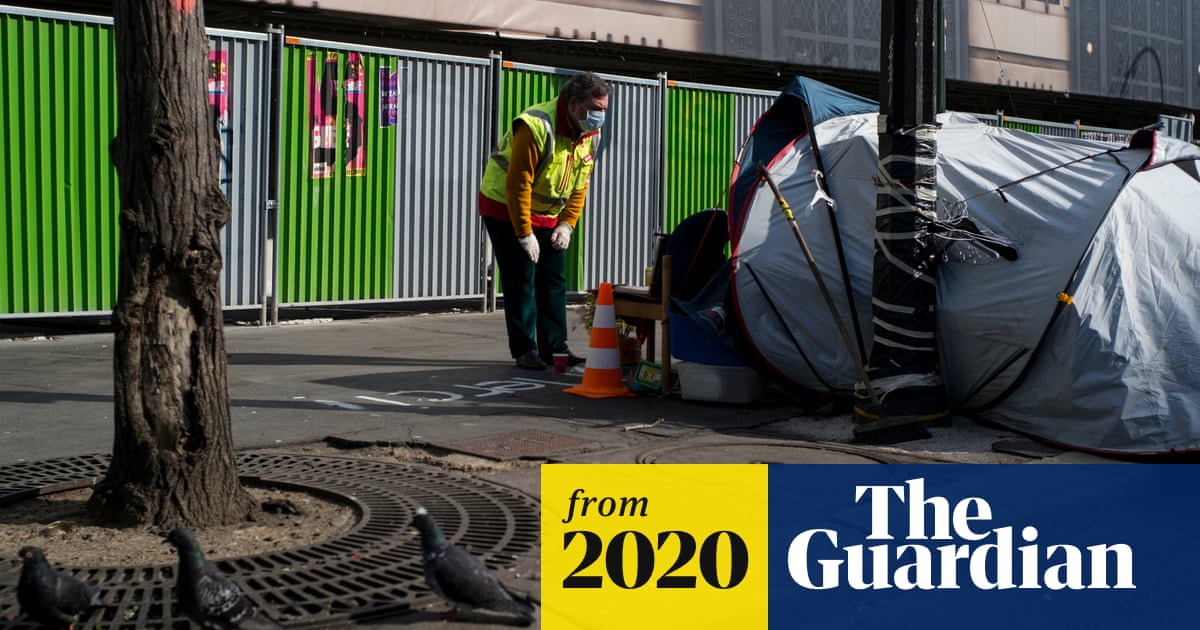- Joined
- Dec 11, 2018
- Messages
- 1,237
- Trophies
- 0
Homeless people in major European cities are increasingly going hungry during the coronavirus pandemic and suffering in the enforcement of the lockdown, with rough sleepers being issued with police fines for being outside.
A shortfall in protective masks, gloves and hand gels for social workers across the continent has forced the closure of the day centres, food banks and soup kitchens on which people rely to keep themselves healthy and fed.
Meanwhile, efforts to minimise the spread of the disease among those without a home have ranged from instructions for shelters in Amsterdam to be shut during the day, forcing people into the open, to what social workers describe as an “absurd” policy of herding people into gymnasiums in Paris to keep them from gathering outside.
The warning of an unfolding crisis among the homeless, who are at greater risk of sickness and death due to the prevalence of pre-existing respiratory disease, is today made by social workers across Europe in interviews with The Guardian. They claimed:
The coronavirus pandemic has hit Europe at a time when record numbers of people are living without a home. There are an estimated 700,000 people on the streets or in shelters on any given night in the EU and the UK, up 70% from a decade ago, and the figures are still on the rise in every country apart from Finland.
- Police in Italy have been handing fines to homeless people, prompting the Italian Federation of Organisations for Homeless People to write to the interior ministry appealing for leniency: “They cannot stay at home because they do not have a home,” the federation said. “It has happened in different cities”, said Michele Ferraris, the federation’s spokesman. “There is an economic sanction which they cannot pay, and they have to go to the magistrate. They are not on the street for fun.”
- Rough sleepers and families living in temporary accommodation, including children, were not able to get enough food. “Normally in Brussels you don’t have people starving, people can find food, but now even that is a problem for people on the street”, said Mauro Striano, a policy officer for a Brussels-based NGO, the European Federation of National Associations Working with the Homeless. Laura Slimani from the Federation of Solidarity Actors in France said: “Food aid is in a problematic situation [in Paris] because of the lack of protective material [for social workers at food banks and day centres]. Last week and until now it is one the big problems.”
- Panicked social workers in Prague were being forced to sew together masks and gloves from scrap material due to the lack of protective equipment. “There is nothing,” said Stepan Ripka, from the Czech NGO Platform for Social Housing. “People have been sewing textile protections together at their home. Once we have the first positive case in the social services it will be a big problem, because people will want to look after themselves”.
The European commissioner for jobs and social rights, Nicolas Schmit, told the Guardian that the fragile state of the system had shown that the policy of economic austerity in the wake of the 2007 financial crisis failed Europe.
Schmit, a former minister in Luxembourg, appealed to governments during recent meetings of ministers to use EU funds avoid more deaths among the most vulnerable.
“Living on the street has a huge impact on mental as well as physical health – the homeless are therefore particularly at risk”, the commissioner said. “They often already have pathologies and therefore are considered to be more vulnerable. The coronavirus will also affect those who accompany the homeless. It is important that the workers are protected too.”
Schmit added: “I say austerity has failed. Austerity has created a lot of social failures, but also social scars in our society… I think of the idea of cutting back on the welfare state, cutting back all the time on public expenditure, the idea that housing can be just resolved by the market. Well, this has not worked.”
Ruth Owen, the deputy director at the European Federation of National Associations Working with the Homeless, said there had been positive moves in recent days in London, Paris, Prague, Barcelona and elsewhere in the requisitioning of hotels, holiday homes and Airbnb properties for homeless people.
But she claimed that a major obstacle lay in separating the healthy from those infected but not showing symptoms. Social workers in Belgium claimed the homeless were being divided based simply on the hint of a cough.
Owen said: “We need targeted outreach in testing for homeless people because they are a particularly vulnerable group, less able to protect themselves and more likely to get sick and die.
“Most of the settings where homeless people can be safely housed are quite dangerous places at the moment if you are not able to separate those infected and not infected.”
“We are also calling for protected gear for people working in the homeless sector, and for homeless services to be considered as essential services,” Owen said. “The food supply is also threatened by the lockdown conditions and there is a big issue of volunteers and staff to provide those services.”

Europe's homeless hit hard by coronavirus response
Warning of starvation risk as lockdowns leave rough sleepers without help and vulnerable to police fines